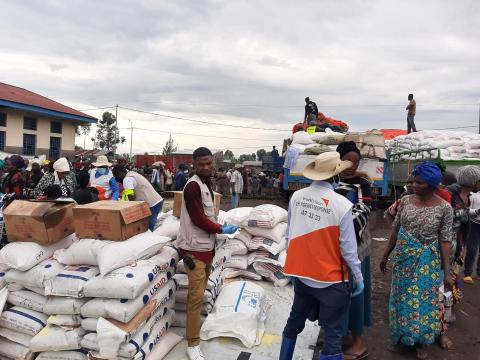World Vision executes emergency response and calls for urgent humanitarian support amid increased violence in Eastern DR Congo

International aid agency, World Vision has delivered emergency food to thousands of survivors who were forced to flee their homes, as surging violence in Democratic Republic of the Congo impacted their communities.
More than 61,000 people have been displaced by fighting as armed groups terrorise villagers who are forced to flee the destruction. Children, as young as 12, many of whom were separated from their parents as they ran for their lives, are arriving unaccompanied at schools and churches, desperate for food, shelter and news of where their families are.
World Vision, in partnership with World Food Programme, has distributed emergency food rations consisting of flour, beans, cooking oil and salt to last 14 days, to 18,700 people.
Those who fled fighting in the east of Democratic Republic of the Congo are living in abysmal conditions. Thousands have sought refuge in temporary locations, such as schools, church compounds, and open-air settlements. There is limited water available, and almost no sanitation facilities; the threat of outbreaks of disease is ever-present. Many remain exposed to the elements, including heavy rainstorms, with nothing but the clothes on their backs. Few have tarpaulins available, and many families are simply building shelters out of available sticks and branches. Host families are also trying to accommodate the displaced, despite facing their own challenges.
“I do not know where my father and mother are. I cannot find them. I think they are dead. No one can help me,” a distraught 12-year-old boy at Kanyarucyinya Primary School in Nyiragongo territory told World Vision staff early last week.
The Democratic Republic of the Congo experiences regular bouts of violence, but the latest surge is of particular concern as it may result in greater regional insecurity. This violence comes on the back of a massive global hunger crisis in which 45 million people are facing starvation in 43 countries. DR Congo accounts for 5.4 million of this total, while 27 million are categorised as highly food insecure. A total 857,000 children and 468,000 women are likely suffering from acute malnutrition.1
World Vision National Director, Aline Napon, said the situation in the Nyiragongo and Rutshuru territories is heart-breaking and thousands of vulnerable children are now at high risk.
“Children have told us they haven’t eaten for days since they fled. Our food will keep the survivors of these attacks alive but the longer-term consequences for children are potentially devastating. Families and children driven from their settlements become much more vulnerable to forced marriage, rape, school drops outs and recruitment into armed groups. This could be something children will never recover from. Urgent humanitarian support for their immediate and longer-term needs is essential in order to avoid the worst-case outcomes for them”
One mother, Riziki Kamete, based at Kanyarucyinya Primary School in Nyiragongo territory East DRC, received food aid from World Vision over the weekend. She told staff: “We’ve had no food to eat since Tuesday. We need help to address our sleeping and living conditions. People crowd into the small classrooms. But most us sleep outside. This crowding, as well as poor sanitation, could lead to disease.”
Riziki's family are among nearly 61,000 people displaced since the resumption of fighting between Dem Rep Congo Forces and M23 rebels one week ago.
World Vision is continuously assessing the scale of children’s needs and working with other agencies to support the most vulnerable with much needed psychosocial support, and protection.
World Vision has been present in DR Congo since 1988. It is focused on improving the well-being of children, especially the most vulnerable in the volatile as well as stable parts of the country.
ENDS.
Notes to Editor
World Vision is a Christian humanitarian organisation dedicated to working with children, families and their communities to reach their full potential by tackling the root causes of poverty and injustice. World Vision serves all people, regardless of religion, race, ethnicity or gender. For more information, please visit www.wvi.org or follow us on Twitter @WorldVision
For further information or to organise an interview, please contact:
David Munkley, East Zone Director for World Vision DRC: +243-974-053351; Email: David_Munkley@wvi.org
Geoffrey K. Denye, Humanitarian Communications Specialist: +243-974-586286; Email: Geoffrey_Denye@wvi.org